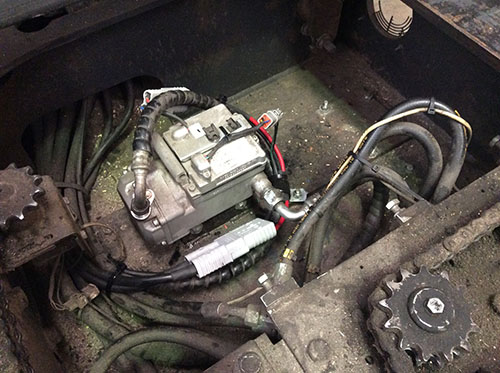Electric compressors – the future of mobile machine air conditioning?
Engine driven air conditioning compressors were first readily installed to mobile air conditioning in vehicles when a company called Packard started installing “Bishop and Babcock Weather conditioners” to vehicles in 1939. Engine driven A/C compressors utilise a belt that is driven off the motor to turn the compressor over to pump the refrigerant around the air conditioning system. This design is what you would see under most of the bonnets of cars, trucks, earthmoving equipment, buses, construction equipment , in fact the majority of mobile equipment. Whilst the engine driven system works, there are negatives found in this design as per below:
* Mechanical shaft seal that can wear over time and cause loss of refrigerant
* Compressor speed is determined by the RPM of the engine turning the compressor over
* Belts can lose tension over time and slip or break resulting in poor performance / vehicle downtime
* Service access to the engine driven compressors can be difficult due to it’s location on the engine. The location of the compressor can also be in a hazardous location for the service technicians who are required to change the units.
* Compressor installation due to size restraints / moutning issues is also difficult and can be expensive due to the compressor mounts that are required to be manufactured to drive the compressor by the internal combustion engine.
* Heat generated in engine bay puts stress / strain on compressors
* Long hose runs in particular suction / discharge lines can be eliminated due to
Electric compressors can provide a solution to the issues above. Electric air conditoning compressors are a hermetic sealed unit which means that the compressor and motor are confined in a sealed unit reducing the mechanical wear issue that occurs on engine driven compressors. The speed of the electric compressor can be controlled utilizing a PWM (Pulse Width Modulation) method or similar to ensure the exact amount of cooling is provided to the machine. This also allows the compressor to “ramp down” or not run at full speed when not required which cannot happen on an fixed displacement engine driven compressor. There are obviously no belts needed for an electric compressor. The other major benefit of the electric compressor is the ability for it to be installed basically anywhere on the machine therefore assisting with installation and ensuring that the compressor can be easily accessed for servicing.
There are however currently a few limitations with using an electric compressor for the air conditioning system on mobile applications. A major limitation is the amount of power required to run the compressor. For example on an installation on an electric forklift that Lyons carried out recently, roughly 2.5kw of cooling an electric compressor required 30amps at 24volt (or 50amps at 12 volt) The technology in this space however is improving rapidly with improvements in charging such as larger capacity alternators to assist in recharging the batteries quicker. Companies such as Lyons continue to spend time in research and developing these systems for use in mobile applications.
Electric compressors are currently being utilised by systems such as the Sigma Anti-Idling system which has been installed on earthmoving equipment by Lyons in the Pilbara and Southwest of Western Australia. The electric compressor in this application is used to maintain the temperature in an earthmoving cabin running off a separate set of batteries to cool the cabin whilst the engine is not running. This provides fuel saving to the owners of these machines as well as service life and economical benefits.
Electric air conditioning compressors are going to continue to be more common in the years to come due to the features discussed in this article and whilst there are limitations mainly due to power consumption as the charging and battery technology, these will continue to be resolved and the future will be heading towards electric technology for air conditioning systems in mobile equipment.



